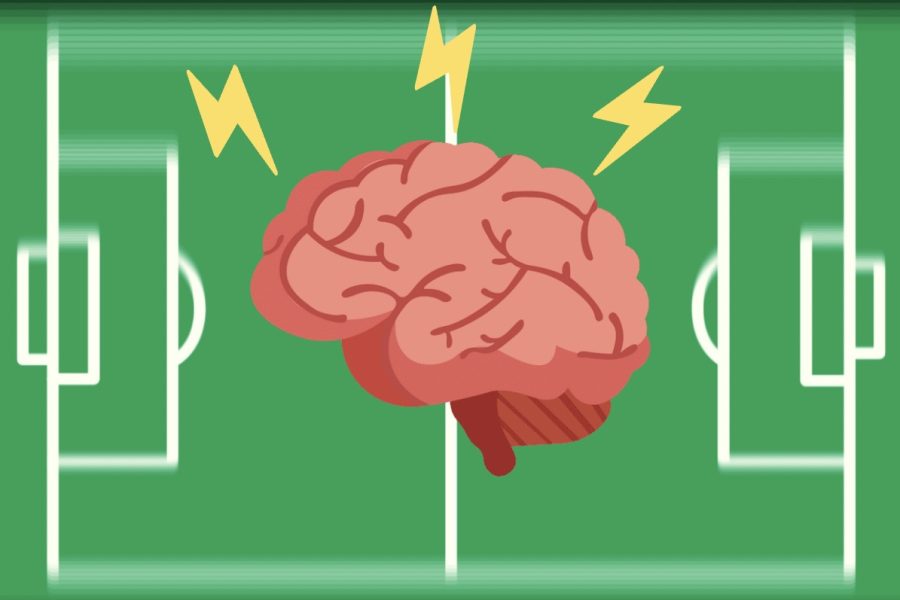Opinion: Concussions affect more than just physical health
Credit: Chloe Zilembo
WSPN’s Chloe Zilembo details her experience as an athlete who suffered a concussion.
December 17, 2022
I’m standing in the field house waiting for wellness class to officially start. Suddenly, a volleyball hits my face, and I land hard on the ground. An intense headache ensues as soon as my head slams the ground. I open my eyes to classmates hovering over me with worried looks on their faces. I didn’t know it yet, but that moment marked the beginning of a grueling concussion recovery journey.
For student athletes, 20% get a concussion in any given sports season. That means that out of the almost 8 million high school athletes, 1.6 million of them will suffer from a concussion. The highest-risk sport for concussions for athletes under 18 is American football. The lowest-risk sport is volleyball. Even though volleyball may be considered a low risk for head trauma, it is still possible to get a concussion.
Getting a concussion in a sport you don’t play can be really aggravating. It’s not like you were doing something you loved and faced the consequences of it. I was playing volleyball because I was forced to for wellness class. It was not an elective decision.
When I had a concussion, my mental health declined. Being away from sports was hard for me. Not only could I not participate in the end of my field hockey season, but I wasn’t even allowed to go to the games to cheer on my teammates. I missed playing the sport I loved.
I felt like I was missing out during the end of my field hockey season. My teammates and coach were incredibly supportive and gave encouraging “get well” messages, but it wasn’t enough for me to feel better about my absence.
My team went on to play in their final regular season game and the playoffs without me. I watched the livestream of the last game, and I couldn’t help but feel left out.
My declining mental state was not the only factor in the long concussion recovery process. There were times when I felt like my head was going to explode. Any loud noise or bright light triggered an intense headache and horrible nausea. It became impossible to complete my schoolwork.
With a concussion, athletes are restricted from doing most physical activities. The only thing you can do with a concussion is to either sit in a quiet room and do nothing, listen to podcasts or music at a very low volume or go to sleep. I opted for the latter. One day I slept 19 hours because my body could no longer handle the stress of being awake. My body was telling me to rest – so I did. As a result, the physical conditioning for field hockey that I had worked so hard on depleted very fast. I could no longer do easy workouts without feeling winded and nauseous.
I slowly built back some of my endurance while following the concussion protocol for student athletes. It was hard, and there were days where I wanted to give up. As a perfectionist, I was angry that my body wasn’t working the way I wanted it to, and I was infuriated how I couldn’t do things as well as I used to. Even simple, light cardio activities like riding a stationary bike for five minutes made me feel dazed and out of sorts.
Despite being cleared to play, I still did not feel like my normal self. After two weeks off, I went to club field hockey tryouts and immediately felt like I was going to throw up. The room was spinning and my vision became blurry. Even though the doctor cleared me to play, my body wasn’t ready. I realized that concussions were not just a physical game, but also a mental game. Medical professionals had cleared me, yet I still didn’t feel like myself.
After a lot of patience, my body and mind eventually recovered. The recovery process taught me a few things. I learned that patience is essential to getting better. Concussion recovery takes time. And that’s okay.





![Last Wednesday, the Wayland School Committee gathered to discuss a number of topics regarding the health curriculum and Innovation Career Pathway course. Another large topic of conversation was the ways to potentially mitigate distracting cell phone usage. "These [phones] are going to distract your learning and social relationships," Superintendent David Fleishman said. "That's concrete right there."](https://waylandstudentpress.com/wp-content/uploads/2025/06/Screenshot-2025-06-04-at-9.49.31 PM-1200x886.png)



























![Troy Hoyt finishes the Boston Marathon, running for the Hoyt Foundation. T. Hoyt is the son of Hoyt Foundation CEO Russ Hoyt.
“[Running a marathon] might seem like a big thing, when it’s presented to you at first, but if you break it up and just keep telling yourself, “Yes, you can,” you can start chipping away at it. And before you know it, you’ll be running the whole 26 miles, and you won’t even think twice about it.” T. Hoyt said.](https://waylandstudentpress.com/wp-content/uploads/2025/04/C36E8761-1CBB-452E-9DF2-543EF7B1095E_1_105_c.jpeg)













































